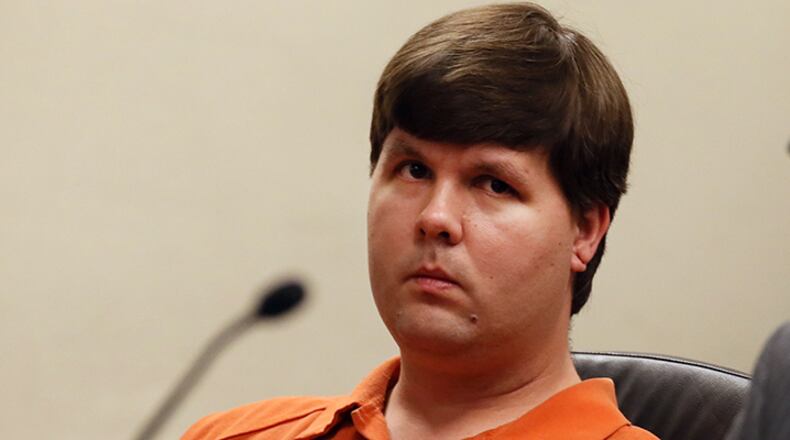The Cobb County District Attorney’s Office won’t retry Ross Harris for murder in the tragic case in which he left his 22-month-old son, Cooper, to die in his hot SUV.
The decision was approved Thursday by Cobb Superior Court Judge Robert Leonard. The reason given by prosecutors was a ruling last year by the Georgia Supreme Court which overturned Harris’s murder conviction and limited evidence in the state’s case.
Harris’s case attracted international attention. Initially seen as a sad, sympathetic father, he drew scorn upon revelations he was a serial philanderer who sent graphic photos to teenagers.
“Ross has always accepted the moral responsibility for Cooper’s death,” his lawyers, Maddox Kilgore, Carlos Rodriguez and Bryan Lumpkin, said in a statement. “But after all these years of investigation and review, this dismissal of charges confirms that Cooper’s death was unintentional and therefore not a crime.”
The attorneys thanked KidsAndCars.org and others for their work preventing hot car deaths. “Their guidance helped us understand how Cooper’s death tragically fits the pattern of how children are unintentionally left in cars,” the statement said.
The Cobb DA’s office said in a statement that over the past 11 months it conducted a thorough review of the case file.
“Crucial motive evidence that was admitted at the first trial in 2016 is no longer available to the state due to the majority decision of the Supreme Court,” it said. “Therefore, after much thought and deliberation, we have made the difficult decision to not retry Justin Ross Harris on the reversed counts of the indictment. ... Cooper will always be remembered by this office and those who fought for him.”
Lead prosecutor Chuck Boring, who is no longer at the Cobb DA’s office, decried the decision and said DA Flynn Broady never reached out to him or the prosecution team that tried the case.
“This decision, without any notice to those most knowledgeable and involved in the case from practically day one of the investigation, is a disservice,” Boring said. “He simply dismisses the charges with no accountability even though everyone, including the Georgia Supreme Court, has stated that the evidence is there.”
The DA’s decision does not mean Harris’s imminent release from prison. He still stands convicted of exchanging graphic text messages with an underage girl, for which he was sentenced to 12 years. He has been in custody since 2014.
Harris was separately indicted in March 2016 for possessing lewd photographs of two underage girls, sending nude photos of himself to those girls and engaging in sexually explicit chats. But the DA’s office has similarly decided not to try Harris on those charges. A court document also signed by Leonard on Thursday said the case was no longer being pursued “at the request, or due to the unavailability, of the alleged victim.”
On June 18, 2014, Harris left home with Cooper to drop him off at day care before going to work at Home Depot. They stopped to eat breakfast at a Chick-fil-A. But Harris later told police he forgot to drop off Cooper and mistakenly left him in his rear-facing car seat in the back seat of his SUV in the company parking lot.
Within hours, Cooper died from heat stroke. Harris told police he realized his mistake when, driving away from work, he noticed his dead son in his car seat.
Harris’s case attracted so much publicity the trial was transferred to Glynn County, where he was convicted. Superior Court Judge Mary Staley Clark sentenced him to life in prison without the possibility of parole.
But in a 6-3 decision almost a year ago, the Georgia Supreme Court overturned the murder conviction, saying Harris did not receive a fair trial because days of testimony detailing his extramarital relationships should not have been allowed.
“The state convincingly demonstrated that (Harris) was a philanderer, a pervert and even a sexual predator,” Chief Justice David Nahmias wrote. “This evidence did little if anything to answer the key question of (Harris’s) intent when he walked away from Cooper.”
But it likely led jurors to conclude Harris was the kind of person who “who would engage in other morally repulsive conduct (like leaving his child to die painfully in a hot car) and who deserved punishment, even if the jurors were not convinced beyond a reasonable doubt that he purposefully killed Cooper,” Nahmias wrote.
Harris’s attorneys said that during the nine years they represented him, they learned tragic hot car deaths often happen while the child is in the care of a loving parent.
“Ross was no different,” their statement said. “He deeply loved Cooper. Ross is no doubt relieved at the dismissal of the charges against him, but he is also thankful that today’s dismissal may begin to restore Cooper’s legacy as a child much loved by his parents.”
Staff writer Alexis Stevens contributed to this story.
About the Author
Keep Reading
The Latest
Featured




